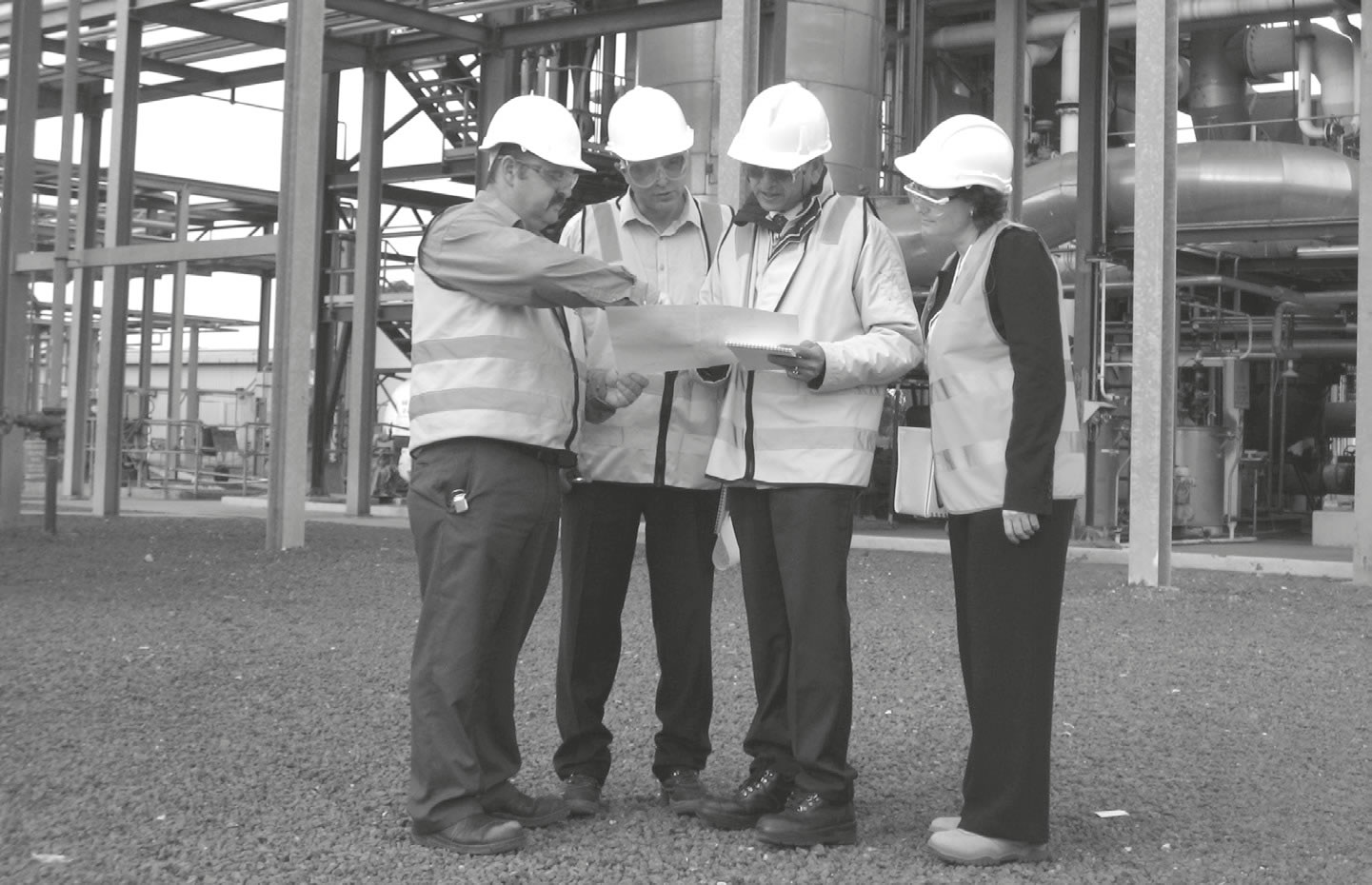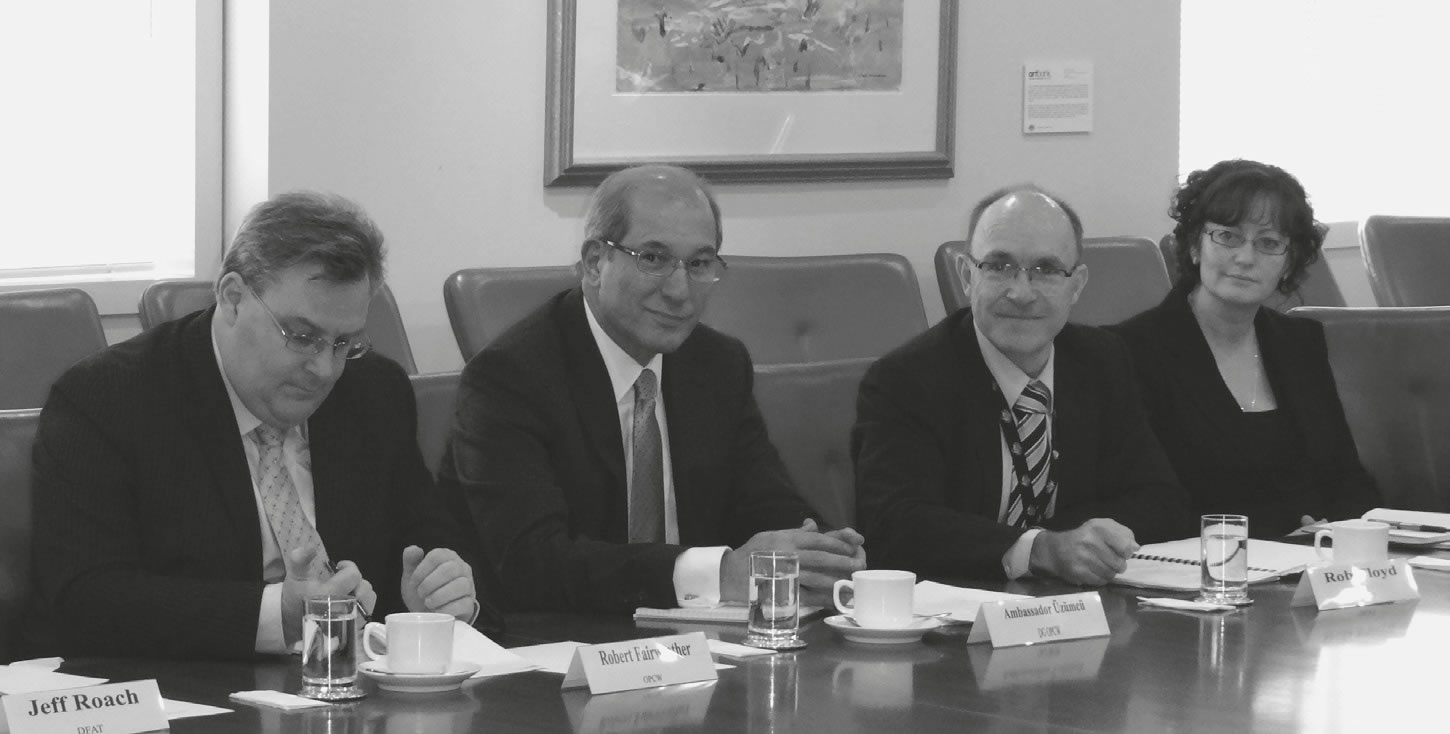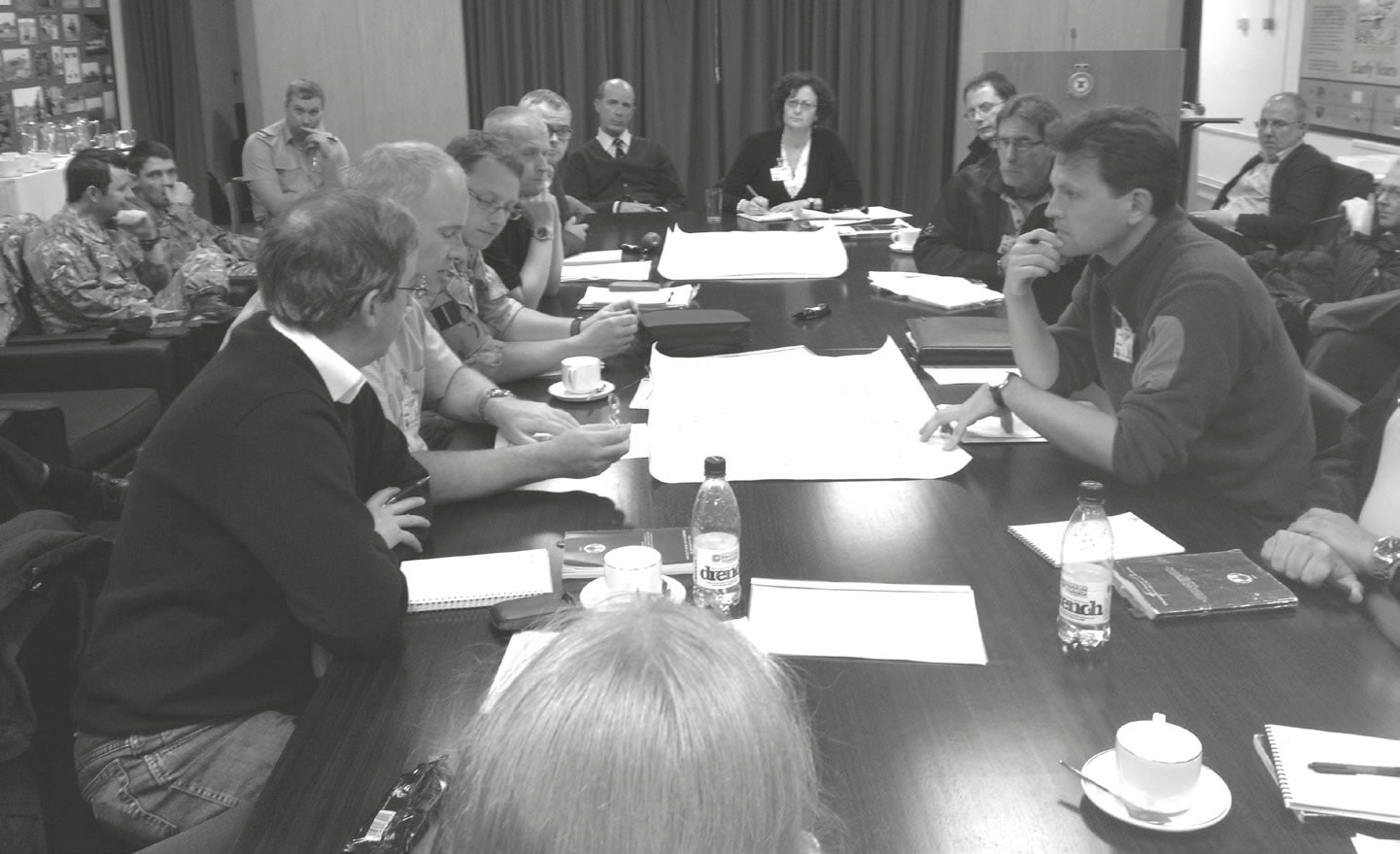Output 1.5: CWC Implementation
Regulation and reporting of Australian chemical activities in accordance with the Chemical Weapons Convention, and strengthening international implementation of the Convention.
Performance Measures
- Australia's obligations under the Chemical Weapons Convention (CWC) are met
- Effective regulation of CWC-related activities in Australia, involving the chemical industry, research and trade
- Contribute to strengthening CWC verification and implementation, including through cooperation with the Organisation for the Prohibition of Chemical Weapons (OPCW) and with CWC States Parties
- Contribute to enhancing regional CWC implementation through targeted outreach
Performance Assessments
Meeting CWC Obligations
ASNO maintained Australia's strong record of performance in meeting its CWC obligations. Comprehensive and timely annual declarations and notifications were provided to the OPCW as follows:
- Article VI declaration of imports and exports of CWC-Scheduled chemicals and of the 40 facilities with CWC-relevant chemical production, processing or consumption activities during 2012 (declared in March 2013)
- Article VI declaration of anticipated activities at nine CWC-Scheduled chemical facilities during 2013 (declared in September and October 2012)
- Article X, paragraph 4, declaration of Australia's national programs for protection against chemical weapons (declared in April 2013)
- responses to OPCW Third Person Notes including routine clarification of the operational status of chemical plants
- response to OPCW request for clarification on mismatch of trade data between Australia's declaration and those of other CWC States Parties
- routine responses to OPCW notifications and amendments/corrections to inspector details and deletions or additions to the OPCW inspectorate.
Since 1997, the OPCW has conducted 43 Article VI routine industry inspections in Australia in accordance with the provisions of the CWC. In the current reporting period, ASNO has facilitated two routine OPCW inspections at declared 'Other Chemical Production Facilities' (OCPFs). Both inspections proceeded smoothly and received excellent support and cooperation from industry. The OPCW inspection team verified Australia's declarations as well as the absence of undeclared CWC-Scheduled chemical production, in accordance with the inspection mandates.

OPCW, ASNO and facility representatives at a routine OPCW inspection at a chemical plant in Victoria (Image: ASNO)
Legislation and Regulation
The permit systems under the Chemical Weapons (Prohibition) Act 1994 and Regulation 5J of the Customs (Prohibited Imports) Regulations 1956, continued to operate well. Table 13 provides statistics for permits issued during the reporting period (1 July 2012 to 30 June 2013).
Table 13: Permits for CWC-scheduled chemical facilities and importers
CWC-Scheduled Chemicals |
CW(P) Act 1994 |
Type |
Permits at 30 June 2013 |
New Permits 2012–13 |
Re-Issued issued Permits |
Permits not re-issued 2012– 13 |
Import Permits 2012–13 |
|---|---|---|---|---|---|---|---|
Schedule 1 |
s19(4) |
Production (Protective) |
1 |
0 |
|||
s19(5) |
Production (Research) |
10 |
4 |
||||
s19(6) |
Consumption |
11 |
1 |
2 |
0 |
||
Schedule 2 |
s18(1) |
Processing |
14 |
1 |
1 |
0 |
59 |
Schedule 3 |
s18(1) |
Production |
3 |
0 |
3 |
0 |
The Attorney-General's Department, in consultation with State and Territory Governments has developed a voluntary National Code of Practice for Chemicals of Security Concern (also refer to www.chemicalsecurity.gov.au). The code is the result of an industry and community consultation process held in 2012 to seek industry views on the best way to reduce the risk of terrorist theft of chemicals from the chemicals supply chain. While the code applies to any quantity of 11 chemical precursors to homemade explosives, it is also relevant to other toxic chemicals such as those listed on the CWC Schedules.
ASNO supported Australia's efforts to raise awareness about chemical security by promoting the National Code of Practice both domestically (during industry outreach) and internationally (during the thematic discussions on Chemical Safety and Security in the margins of the 3rd Review Conference).
Cooperation with the OPCW and CWC States Parties
ASNO facilitated the visit to Australia by the OPCW Director-General Ahmet Üzümcü from 24 to 26 July 2012 where he held discussions with the Foreign Minister and a number of Government officials in Sydney and Canberra. Director-General Üzümcü also appreciated meeting with senior representatives from non-government organisations such as the Plastics and Chemicals Industries Association and the Australian Strategic Policy Institute as part of his efforts to strengthen OPCW engagement with civil society on CWC implementation issues. This visit helped reinforce Australia's ongoing engagement with the OPCW and demonstrated its commitment to the CWC.

OPCW Director-General Ahmet Üzümcü and ASNO Director General Robert Floyd with ASNO and DFAT staff at a meeting held during Mr Üzümcü's visit to Australia, July 2012
Director-General Üzümcü's public addresses were well-received. His speech at the Lowy Institute for International Policy, Sydney, focussed on the challenge of chemical weapons disarmament. Director-General Üzümcü also delivered the annual Dr John Gee31 Memorial Lecture at the Australian National University, Canberra. These presentations raised awareness and understanding of the CWC and the OPCW's role among stakeholders from industry, government and academia.
ASNO continued to provide ongoing technical guidance – and contribute to policy development – in preparation for OPCW Executive Council meetings, industry cluster meetings and informal consultations. Issues under discussion during the reporting period included:
- sequential inspections at mixed plant sites (i.e. sites where more than one type of facility has been declared, such as a Schedule 3 and an OCPF)
- a proposal to revise the product group codes to encompass chemical activities at OCPFs for declarations purposes
- improving the efficiency and effectiveness of the OPCW Executive Council's working methodologies
- the OPCW programme and budget for 2013
ASNO participated in the 14th Annual Meeting of National Authorities of CWC States Parties held in The Hague from 22 to 24 November 2012. The meeting was attended by 206 participants from 118 States Parties, and included breakout sessions focusing on six different topics, and a session on outreach and education activities. The informative segment of the meeting brought the participants up to date with latest developments in declarations, inspections and international cooperation and assistance, while regional groups met to discuss ways and means to foster sub-regional and regional cooperation for implementation of the Convention.
The 17th Conference of the States Parties took place from 26–29 November 2012 and was attended by delegates from 132 States Parties. The Conference was considered a success in that it endorsed all recommendations of the Executive Council. Australia's delegation was headed by Australia's Permanent Representative to the OPCW, Ambassador Neil Mules, and included representatives from the Department of Defence and the Australian Embassy. Australia's statement to the Conference identified four key areas of focus for the future work of the OPCW:
- Enhanced verification of other chemical production facilities, taking into account relevant advances in science, technology and industry operations
- Promoting full and effective national implementation of Articles VI and VII, including through enhanced education and outreach to research institutions and industry to help prevent chemicals from being diverted for non-peaceful purposes
- Development of chemical security strategies to prevent the deliberate release of toxic chemicals by non-State actors
- Support in assistance and capacity building for protection against chemical weapons, including against the deliberate release of toxic industrial chemicals.
Australian experts from DFAT, ASNO and the Defence Science and Technology Organisation also participated in the 3rd Review Conference (3rd Revcon) for the CWC which took place in The Hague from 8–19 April 2013. ASNO played a key role in support of Australia's efforts to provide advice for the review of the operation of the Convention over the past five years and identifying key positions which were ultimately preserved in the Conference Report (see also Current Topics on page 21).
ASNO continued to work with other States Parties to strengthen implementation of the Convention. At New Zealand's invitation, ASNO visited Wellington (December 2012) to conduct a peer review of its National Authority's administrative arrangements in regards to CWC implementation. ASNO also held bilateral discussions with New Zealand's National Authority during a visit to Canberra in May 2013 on CWC implementation issues of mutual interest.

OPCW, ASNO and UK Government representatives at a practice challenge inspection exercise in the UK
ASNO attended, as both participant and observer, a practice challenge inspection exercise held in the United Kingdom (October 2012) to train OPCW inspectors. The lessons learned will help strengthen participants' ability to conduct this type of inspection, although no challenge inspections have been requested since the Convention entered into force.
Domestic Outreach
To assist ASNO in meeting its CWC reporting obligations, ASNO continued to strengthen its engagement with the chemical industry. As foreshadowed in ASNO's first newsletter (November 2012) for the chemical industry, two seminars were held in Sydney and Melbourne in 2013 to raise awareness among industry stakeholders about how the CWC affects them. Participants were informed about the CWC and obligations for chemical producers and importers under the Chemical Weapons (Prohibition) Act 1994 and the Customs (Prohibited Imports) Regulations 1956, respectively – legislation administered by ASNO.
ASNO also conducted outreach visits to the Defence Science and Technology Organisation (which hosts Australia's only Schedule 1 facility for protective purposes) and a number of chemical facilities which were relatively unfamiliar with the CWC. Discussions focussed on promoting greater awareness of the CWC, regulatory obligations and preparing declared sites for OPCW inspections. ASNO representatives verified the information provided in their annual notifications.
ASNO continued its close cooperation on CWC implementation issues with the Plastics and Chemical Industries Association as well as other Government agencies including the Defence Export Control Office, Australian Customs and Border Protection Service, the Department of Immigration and Citizenship and the Attorney General's Department's Chemical Security Unit.
31 Dr John Gee (deceased) was a former Australian diplomat who also served as a member of the UN Special Commission to oversee the elimination of Iraq's weapons after the first Gulf War in 1991. Dr Gee worked at the OPCW Prepcom as Director of the Verification Division (1993-1997) and was promoted to the position of OPCW Deputy Director-General (1997 to 2003).